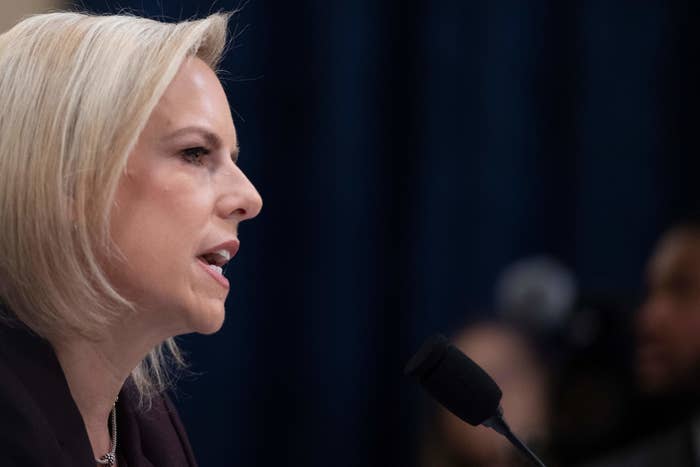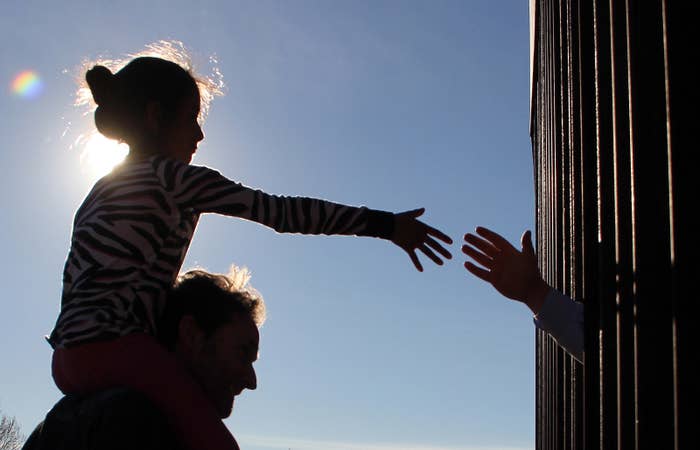
The secretary of homeland security told members of Congress on Wednesday that her agency had uncovered "recycling rings" where children were used multiple times to help undocumented immigrants enter the United States by claiming to be part of a family.
“We have even uncovered ‘recycling rings’ where innocent young people are used multiple times to help aliens gain illegal entry,” Kirstjen Nielsen told the House Homeland Security Committee. “As a nation we simply cannot stand for this. We must fix the system."
Nielsen appeared before the committee to discuss border security, at a time when agents are apprehending a record number of families at the border and the Trump administration is still facing backlash over last summer's "zero tolerance" policy that resulted in the systemic separation of families at the border.
Nielsen did not offer any evidence to back up her assertion and it was unclear how prevalent the so-called recycling rings are. DHS and Immigration and Customs Enforcement (ICE) spokespersons did not provide any specific instances where such activity took place.
Last month, during a White House meeting on human trafficking at the border, Carl McClafferty, associate chief of intelligence at US Border Patrol, described an investigation in Charleston, South Carolina, that included a woman involved in a ring.
The investigation stemmed from authorities noticing that repeat sponsors of family units were for the same person, address, and phone number, McClafferty said. It resulted in indictments that included one woman who said she was being paid $1,500 per child to take children who were not part of an actual family unit back to Guatemala.
"She claimed to do this 13 times, and so we found out they were recycling these children," McClafferty said. "They would bringing them up, smuggling them as part of a family group, recycle them back to Guatemala, put them in another family group, and come back up."
ICE said court proceedings for the case McClafferty mentioned were still ongoing and referred questions to the US Attorney’s Office for the District of South Carolina, which did not immediately return a request for comment.

Scott Shuchart, a former senior DHS adviser, told BuzzFeed News ICE and CBP have been making the claim since at least 2016, but the South Carolina case is the only specific incident of this he's heard of.
"I am not saying it had never happened before (or that this one is necessarily legitimate), but I am not aware of them having been this specific about any incidents before," said Shuchart, who served as senior adviser at the office for Civil Rights and Civil Liberties at the DHS.
Shuchart said DHS had looked into routinely fingerprinting children it apprehended to identify these cases, but as of his departure from DHS in 2018, no such policy had been put into place.
Michelle Brané, director of migrant rights and justice at the Women's Refugee Commission, said if children are being repeatedly smuggled as part of fake families at the border, it's very concerning.
"I've never seen an actual case of it despite the government bringing it up several times," Brane told BuzzFeed News.
Nielsen's concern over "recycling rings" conflicted with White House statements calling for an amendment to the Trafficking Victims Protection Reauthorization Act of 2008 (TVPRA) that would allow the US to quickly deport unaccompanied children, Brane said.
The 2008 law requires the US to transfer unaccompanied children from countries other than Mexico and Canada into the custody of the Department of Health and Human Services and receive a guaranteed immigration court hearing. The Trump administration has referred to the law as a loophole being exploited by Central American children and their families.
"It makes no sense. They claim it's driving kids into trafficker's hands and creating an incentive," Brane said. "What it does is takes kids out of dangerous routes and into the hands of agencies processing them and undermining the trafficker."
If "recycling rings" were a serious concern for the administration, it would invest more money into smuggling investigations as opposed to cutting funds and redirecting them to arrest, detain, and deport immigrants, said Brané.
"If this is really happening, we need to get to the bottom of it," she said. "What is clear is there is not a realistic effort to address this."
